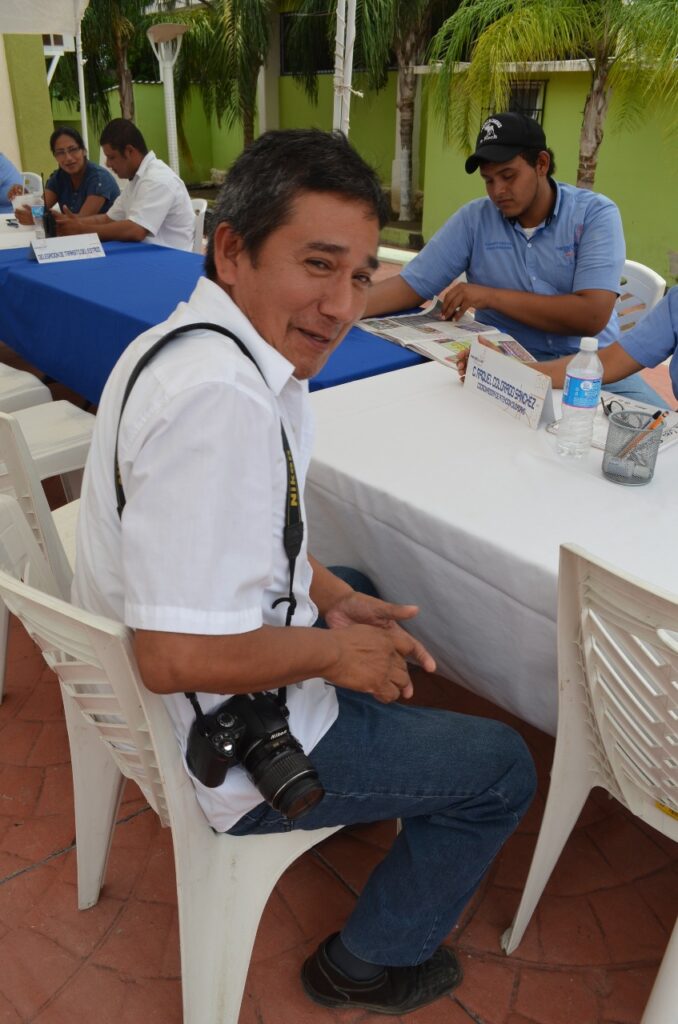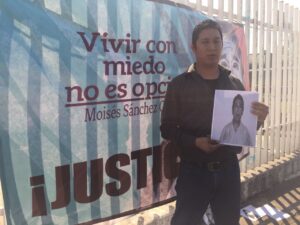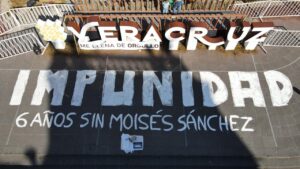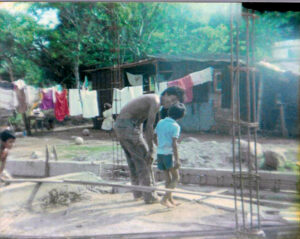On the occasion of the International Day to End Impunity for Crimes against Journalists, LatAm Journalism Review highlights four emblematic cases in the region that remain largely unpunished.
Since the abduction of Mexican journalist José Moisés Sánchez Cerezo was reported on Jan. 2, 2015, his family has received promises: the promise that they would find him soon, and days later, the promise that they would find him alive. When he was finally found dead on Jan. 24, promises came that the culprits would be brought to trial.
“Promises that are not kept, empty promises, empty speeches,” his son Jorge Sánchez told LatAm Journalism Review (LJR).

Mexican journalist Moisés Sánchez Cerezo during a reporting assignment. (Photo: Courtesy Jorge Sánchez)
The killing of Moisés Sánchez is one of 23 murders of journalists in Mexico during the last decade that remain in “complete impunity,” according to the Committee for the Protection of Journalists (CPJ). Mexico is the 7th worst country in CPJ’s newly published 2023 Global Impunity Index, which only accounts for journalists killed for doing their jobs.
Jorge Sánchez, who followed in his father's footsteps as director of the newspaper La Unión in the municipality of Medellín de Bravo, in the state of Veracruz, said that for the last almost nine years, he has dedicated himself to “fighting and fighting” to achieve justice for his father. He was killed after reporting on self-defense groups that highlighted failures of local and state authorities.
In fact, since the moment he was abducted and then later killed, there have been suspicions that the then-mayor of Medellín del Bravo, Omar Cruz Reyes, as well as members of the local police, were involved in some way.
But justice has not come. Freedom of expression organizations like Article 19 have called attention to the case of Moisés Sánchez as one in which “access to justice has been conditioned and at serious risk,” as noted in a statement on Jan. 24, 2023, eight years after the journalist’s body was found.
Article 19 highlighted that the investigation has been “marred by human rights violations,” including allegations of torture from someone who confessed to being the mastermind of the murder. “Added to the above is the lack of due diligence, which translates into a lack of clear lines of investigation and investigative acts,” the organization added.
As the organization reported, in 2018 the oversight office of the then-Attorney General's Office of the Republic confirmed that the “investigation was going nowhere and was filled with senseless acts.”
“Eight years after the fact, family members, journalist colleagues and friends of Moisés still have not obtained truth and justice for the events that occurred. The authorities in charge of protection and investigation have failed to comply with the minimum standards of human rights and support for victims, re-victimizing them and failing to comply with protocols on the matter,” Article 19 said.
To understand some of the irregularities in the investigation of the murder of Moisés Sánchez, his son said, it is necessary to understand life in his city. Medellín de Bravo is located in the state of Veracruz, about 30 minutes from the Port of Veracruz. Due to its strategic location, the town began to see an increase in insecurity, such as abductions, robberies, extortion, and other crimes in which members of the police were allegedly involved.
The community, faced with this situation, decided to create a surveillance committee, a type of self-defense group that had been created in other cities in the country. In December 2014, Moisés Sánchez published a video on his outlet’s Facebook page that showed how the committee members, armed with sticks, machetes and other rustic items, made their nightly rounds.
“This article caused a lot of commotion,” Jorge Sánchez said.
Journalists from other cities descended on the town, as did state and federal authorities and members of the Navy and the Army who committed to improving the town’s security. One of the proposed solutions had to do with the arrival of the civil force, a kind of elite police that would work with the municipal police.
For Jorge Sánchez, the impact of the publication seemingly annoyed municipal and state authorities.
“The fact that a self-defense group was being formed in Veracruz spoke of the failure of the State, both at the state and federal levels,” Jorge Sánchez said.

Jorge Sánchez, son of Mexican journalist Moisés Sánchez, during a demonstration demanding justice for crimes against journalists. (Photo: Personal archive of Jorge Sánchez)
In fact, a few days after the video was published and state and federal authorities visited the municipality, Moisés Sánchez told his wife that the then-mayor of Medellín de Bravo, Omar Cruz, was allegedly planning an attack against him.
“My mother tells me, and the next day I ask my father when I see him and we have a talk about it. He didn't believe this was going to escalate,” his son said.
Just before 7 p.m. on Jan. 2, 2015, six armed men entered Moisés Sánchez's home and abducted him. The convoy of at least five vehicles carrying more men passed in front of two police officers who were standing guard two blocks from the journalist’s home, witnesses told authorities. The officers were in the neighborhood as part of a security plan to decrease crime.
“Impunity starts at the moment the crime happens,” Jorge Sánchez said, pointing out that despite the fact that two police officers saw the convoy coming and that he made a call 20 minutes after the abduction, a search operation wasn’t mounted until two hours later.
Jorge Sánchez pointed out many irregularities that have occurred in the almost nine years since his father’s murder. In addition to the delay in searching for his father, he also noted the order for the arrest of 13 members of the Medellín police, except the commander, who fled the town and later turned himself into authorities only after his appeal for protection was approved.
When the Attorney General's Office of the State of Veracruz announced the discovery of the journalist's body, it also announced the detention of former municipal police officer Clemente Noé Rodríguez. According to the Attorney General’s Office, Rodríguez had confessed to the journalist's murder. As part of his confession, he said that he was following the order of the deputy commander of the municipal police, Martín López Meneses, who in turn had received the order from then-mayor Omar Cruz Reyes, as the Veracruz Attorney General’s Office reported at the time.
Rodríguez also gave the aliases of other people who were allegedly involved, but later reported having been tortured to confess.
There is no other information about those people identified only by aliases.
“There were no names, nothing. But they didn't even ask him to give details for sketches,” Jorge Sánchez explained.
These sketches were eventually done because Jorge Sánchez asked why they did not exist. But not everything about Rodríguez was investigated: for example, his contacts, his telephone calls nor his personal ties, according to Jorge Sánchez.
“On the other hand, they had all our records, my mother's, mine, my friends’. But they have nothing about the person who confessed to the crime,” Jorge Sánchez added. “There are many things where, despite the fact that he was detained and that if he was responsible, there is no serious investigation against him for some strange reason.”

Jorge Sánchez, son of Mexican journalist Moisés Sánchez Cerezo, demands justice for the 2015 murder of his father. (Photo: Personal archive of Jorge Sánchez)
In the days after Moisés Sánchez's abduction, a person who looked like a police officer, but without official identification, showed Moisés' wife and another witness a series of photographs, the journalist’s son said. They clearly identified two people as being among those who entered Moisés' house, and two others who were probably also there.
The Attorney General of Veracruz never followed up on the suspects identified in the photos, though, and those photos have since seemingly disappeared, according to Jorge Sánchez. “All this time it has been like that," he said.
For Jorge Sánchez, it also makes no sense that police never requested images from cameras that were in the area.
“It turns out that they had not requested those videos from those cameras which [the vehicles that abducted Moisés Sánchez] had to go pass by […] From the beginning there were very strange things,” Jorge Sánchez said.
“What surprises us is that this continues despite the changes in administrations, that is, there is no one to investigate,” Jorge Sánchez said. “I basically end up giving them classes on how to do an investigation because they are obvious things, basic things.”
On two occasions, Jorge Sánchez has presented his father's case before the current president of Mexico, Andrés Manuel López Obrador, during his well-known morning press conferences. After these speeches, he and relatives of other journalists who were victims of disappearances or murders had meetings with officials of the president’s office, from which they received “many promises,” he said.
Faced with so many promises, Jorge Sánchez said that he prefers to be told the truth.
“For cases that have been going on for more than five years, what justice are they going to give? In other words, the evidence that they did not collect will not be collected. Those who lost it do not even make an attempt to recover it; there is a lack of effort,” Jorge Sánchez said. "Let them be honest with their families and say 'we have failed as a State' and we must see a way to guarantee another type of justice."
Jorge Sánchez has presented his father's case at the UN, at the European Parliament and this year, convinced that he will not find justice in Mexico, he presented it to the Inter-American Commission on Human Rights (IACHR).
“To date, even though we have mentioned it […] no one, neither the federal nor the state [prosecutor's office] have wanted to investigate in depth, even though there have been changes in officials, there have been three different prosecutors of the three strongest parties in Mexico,” said Jorge Sánchez, who added that his father's case has gone through three governors of Veracruz, two presidents of Mexico and different state and federal prosecutors.
“In other words, impunity prevails despite partisan colors.”
Moisés Sanchez’s case is before two entities: the office of the Attorney General of the State of Veracruz and the office of the Special Prosecutor for Attention for Crimes Against Freedom of Expression, which is part of the Attorney General's Office of the Republic.
After almost nine years, only one person is currently detained: the confessed perpetrator, Clemente Noé Rodríguez.
In 2016, the two police officers who were on guard on the day of the abduction, Luigi Heriberto Bonilla Zavaleta and José Francisco García Rodríguez, were sentenced to 22 years in prison for the crimes of qualified intentional homicide and breach of legal duty. This sentence was appealed and modified to six and a half years for breach of legal duty, and in 2021 they were released.

Demanding justice for the murder of Moisés Sánchez Cerezo outside a public institution in Veracruz, Mexico. (Photo: Courtesy Jorge Sánchez)
In 2022, a court confirmed the first sentence against Bonilla Zavaleta, so the accused filed a new appeal for protection. In March 2023, Bonilla Zavaleta was recaptured, but released a day later. Finally, on Aug. 21, 2023, the First Collegiate Court in Criminal Matters of the Seventh Circuit acquitted Bonilla Zavaleta.
José Francisco García Rodríguez remains free.
There is an arrest warrant against the mayor of Medellín de Bravo, Omar Cruz Reyes, accused of being the mastermind of the crime. Although from the beginning he was accused by the perpetrator of being involved in the crime, he fled the town in 2015 after he was expelled by Congress. He has been a fugitive since.
Martín López Meneses, who in addition to being the deputy commander of the police was the driver and escort of former mayor Cruz Reyes, obtained a favorable ruling in a trial due to lack of evidence. There are no further investigations into his possible involvement in the crime.
Concerning the six people who entered Moisés' home, only aliases and sketches are available.
“We recently met with the Veracruz prosecutor about my father's case, and it turns out that they were just going to see how the case was proceeding,” Jorge Sánchez said. “[They tell us] to be patient, that we will soon find them. I mean, we've been patient for eight years and they're not doing anything. I mean, they are totally shameless, right?”
The Attorney General's Office of the Republic did not respond to LJR’s request for comment before the publication of this article.
Ministerial sources from the Attorney General of Veracruz told LJR they cannot give details because it is an open investigation and there are outstanding arrest warrants.
“The Attorney General [of Veracruz] has said it and reiterates it: in this, as in all cases of journalists who have been harmed, there will be no impunity. Here in Veracruz, practically of all the cases of attacks on journalists that we have heard about, in all cases there are detainees, all are linked to proceedings and all are practically in the trial stage,” ministerial sources told LJR.

Mexican journalist Moisés Sánchez stands with his son Jorge when he was a child. (Photo: Personal archive of Jorge Sánchez)
Despite this commitment, the numbers of murders of journalists in Mexico and the cases that have been punished indicate otherwise: from 2000 to September 2023, Article 19 recorded the murders of 162 journalists. The impunity rate for these crimes is 98 percent according to records from both Article 19 and Mexico’s National Center for Social Communication.
Veracruz is one of the most violent states for journalists: 31 of the 162 murders were committed there. The most violent era was that of former Governor Javier Duarte (2010-2016), who is currently in prison for criminal association and money laundering. Eighteen of these murders were recorded during his time in office. These crimes, as well as those that have happened afterwards, have gone unpunished. It is worth noting that Moisés Sánchez was killed while Duarte was governor of Veracruz.
Given this panorama, Jorge Sánchez hopes that the final decision will be in international bodies. And while this is happening, he continues with the work at La Unión, doing what his father used to do. He also helped found an association of relatives of murdered or missing journalists to continue pressing for justice, but especially not to forget and to vindicate the memory of their loved ones.
“We as family members have to go through not only the victimizing, atrocious event of having them come to your house and abduct your father, murder him or shoot him,” Jorge Sánchez said. “But apart from that, we have to fight against a State that says that they have murdered the journalist because he deserved it.”